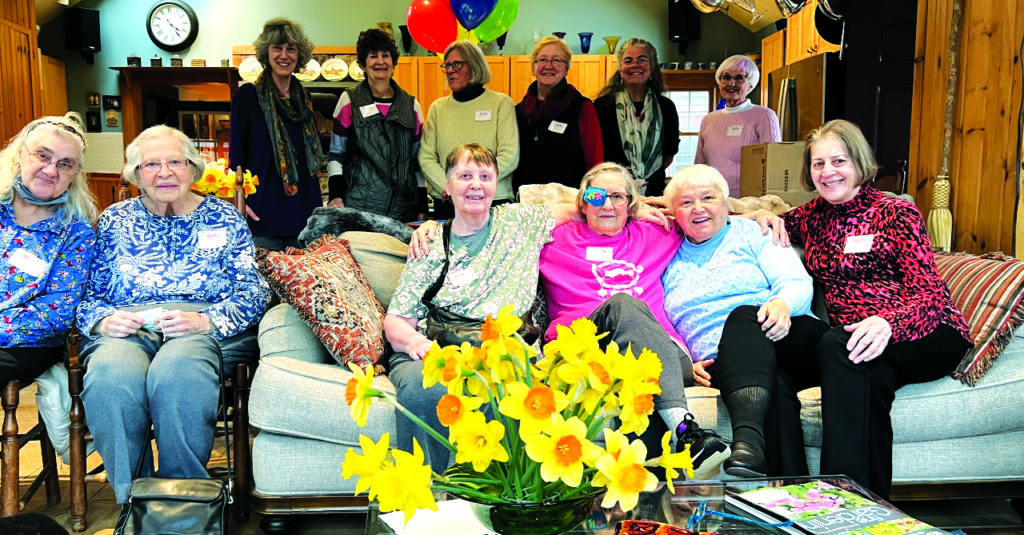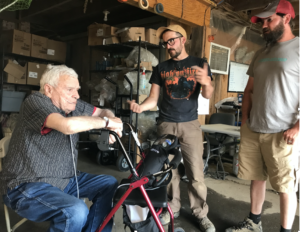Pat Cashmore takes aging seriously.
The 87-year-old Dartmouth woman is careful about how she maintains her independence and not afraid to ask for help when needed. And a helping hand is exactly what she needs to be able to remain in her home independently.
Cashmore was a clinical social worker before she retired and saw many older adults forced to go into nursing homes because they could no longer take care of themselves on their own.“I was just heartbroken for them because with a little bit of help they could have stayed home,” she said.
So, at age 84, after getting her hip replaced and coming home to find she couldn’t manage regular household upkeep – like bringing her deck furniture in for the winter – she decided to take advantage of a new, untested, local organization designed to help older adults stay in their homes as they age.
It was October of 2017 and Coastal Neighbors Network in Dartmouth had launched that September. Cashmore believes she may have been the very first sign-up for the member-based organization that provides services and social activities for its members in their homes and neighborhoods.
Coastal Neighbors Network is one example of a village-style movement designed by older adults who wanted to age in place. It is part of a growing network of independent village organizations across the country that began 20 years ago in Beacon Hill. Most are nonprofits with minimal staff that charge monthly membership fees and provide both services and social activities with the help of volunteers.
“Aging in place has never been more important,” said Gina Paglucia-Morrison, executive director of the Beacon Hill Village in an Encore Boston Network presentation on the village movement. “COVID, I think, shone a bright light on the importance of community, community-based service, and the importance of neighbors helping with all those essential things.”
Beacon Hill Village started in 2002 when a group of neighbors came together to find a way to stay active as they age and enjoy better quality of life. In a 2017 NPR story on their founding, one member described the group’s purpose this way.
“It’s a grass-roots movement on the part of older people who did not want to be patronized, isolated, infantilized,” Susan McWhinney-Morse told NPR. “That’s what we felt was out there for us. And we felt quite competent in taking care of ourselves and staying in our own homes, which in 2000 was absolutely revolutionary.”
Most Americans want to age in their homes. In a 2021 survey, AARP found that 77 percent of adults age 50 and older said they wanted to remain in their homes for the long term. Those numbers have stayed consistent for a decade or more and were unchanged even after COVID-19 related lockdowns.
That may be behind the fast growth of the village movement in the U.S. As of April, there were 25 village-style organizations in Massachusetts alone, 280 across the country, and another 80 in development.
Nearing its five-year anniversary, Coastal Neighbors Network is growing too. It started as a Dartmouth-based nonprofit but now also accepts members in Westport. It charges monthly fees for access to services such as transportation, yard work, friendly visits, and simple home chores. Multiple membership tiers exist but the main tier, including both services and social activities, is $660/year for individuals and $900/year for households of two or more people.
Executive director Andy Pollock says Coastal Neighbors Network has never turned a member away and has funding to subsidize fees if needed.
“Our purpose is to help people age in community,” he said. “We want them to age at home but we also don’t want them to age at home alone. We have a vibrant and dynamic community where they can feel welcome, they can interact, and feel valued and get out more.”
The organization has more than 100 members currently and nearly 100 volunteers, with overlap between the two groups. It is serious about helping older adults stay connected, according to Pollock and the CNN website which states, “Of all the benefits Coastal Neighbors offers the best may be the sense of wellbeing that comes with expanding connections, building new friendships, and knowing you are part of a community who cares.”
“When someone joins, we connect them with a neighbor, someone physically close to them,” explained Pollock. “There becomes a bond between the volunteer and member…We try as much as we can to put people with similar interests together.”
For example, he said, one volunteer sees a woman every other day. “She needs socialization and was feeling isolated. They go for walks together all the time. He was a therapist and likes to listen and she likes to talk.”
Cashmore, a widow who lives alone, says Coastal Neighbors helps with the many small chores she can no longer do like vacuuming the inside of her car, changing a light bulb, or lifting a heavy pan out of the oven.
Every week, Cashmore collects the garbage from her two-story home and leaves the bag on her deck. Coastal Neighbors takes it from there, arranging for someone to take the trash to the curb for her. When she needed a ride home recently after bringing her car in for service, a Coastal Neighbors volunteer picked her up.
Coastal Neighbors also helped her after she had minor surgery. For the few weeks that she was unable to lift anything, they brought her laundry basket down the stairs and even lifted her mattress so she could change the bed sheets.
Cashmore recommends village style organizations for people who are worried about the future and how they are going to be able to manage living at home. She sees the organization as providing support for adult children too, especially those termed the “sandwich generation,” who are caring for children and aging parents at the same time. “It’s almost too much for them,” she said. “You’re really taking care of two generations. In Coastal Neighbors Network you’re helping the (older) person and then you’re relieving the younger generation.



Recent Comments